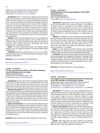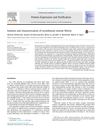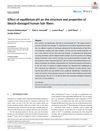 January 2023 in “Springer eBooks”
January 2023 in “Springer eBooks” Epidermolysis bullosa is an inherited condition causing fragile skin with no cure, managed by wound care and experimental treatments show promise.
September 2023 in “Animals” Hair follicle development in cashmere goats involves dynamic changes in proteins and metabolites, with key roles for oxytocin, MAPK, and Ca2+ pathways.
 September 2011 in “Clinical Biochemistry”
September 2011 in “Clinical Biochemistry” The demineralized bone matrix scaffold is better for cell attachment than the mineralized bone allograft.
 October 2024 in “International Journal of Molecular Sciences”
October 2024 in “International Journal of Molecular Sciences” Rosa rugosa extract promotes hair growth and could be a natural treatment for hair loss.
 7 citations,
May 2022 in “PLOS ONE”
7 citations,
May 2022 in “PLOS ONE” Certain genes and pathways are linked to the production of finer and denser wool in Hetian sheep.
 16 citations,
August 2015 in “Protein Expression and Purification”
16 citations,
August 2015 in “Protein Expression and Purification” Scientists successfully made a human growth factor in a plant, which could help with hair growth and bone development.
September 1989 in “Neuroscience letters” People need different amounts of biotin based on age, and not getting enough can cause health problems.
 35 citations,
January 2017 in “Journal of Dermatological Science”
35 citations,
January 2017 in “Journal of Dermatological Science” Stress can cause early aging in certain skin cells, leading to problems with hair growth.
 March 2005 in “International Journal of Cosmetic Science”
March 2005 in “International Journal of Cosmetic Science” DVI provides detailed 3D imaging of hair and shows how various products protect and enhance hair.
 188 citations,
May 2009 in “Plant physiology”
188 citations,
May 2009 in “Plant physiology” Researchers found 19 genes important for root hair growth in a plant called Arabidopsis.
 3 citations,
December 2021 in “Recent patents on anti-cancer drug discovery”
3 citations,
December 2021 in “Recent patents on anti-cancer drug discovery” SET7/9 enzyme affects cell growth and diseases like cancer, diabetes, and obesity.
 32 citations,
January 2000 in “Skin pharmacology and physiology”
32 citations,
January 2000 in “Skin pharmacology and physiology” Certain substances that block a specific protein help promote hair growth.
Weight loss and low folic acid levels after sleeve gastrectomy can predict hair loss severity.
5 citations,
January 2018 in “Interdisciplinary sciences: computational life sciences” Accurate protein modeling can help develop new treatments for prostate cancer and other diseases.
4 citations,
September 2013 in “Journal of biomolecular structure and dynamics/Journal of biomolecular structure & dynamics” Caribine from traditional Chinese medicine may help treat hair loss.
 11 citations,
April 2019 in “Journal of Biological Research”
11 citations,
April 2019 in “Journal of Biological Research” The study identified 12 potential biomarkers for hair loss and how they affect hair growth.
 79 citations,
January 2017 in “Dermatology practical & conceptual”
79 citations,
January 2017 in “Dermatology practical & conceptual” Correcting nutrient deficiencies may help with hair loss, but the benefits of supplements without a deficiency are uncertain and could be harmful.
6 citations,
June 2016 in “Journal of cellular biochemistry” The Hr protein binds to DNA, interacts with p53, and affects cell cycle genes.
 86 citations,
October 2005 in “Experimental Dermatology”
86 citations,
October 2005 in “Experimental Dermatology” The Foxn1 gene mutation causes hairlessness and immune system issues, and understanding it could lead to hair growth disorder treatments.
 5 citations,
May 2022 in “Fashion and Textiles”
5 citations,
May 2022 in “Fashion and Textiles” Hair conditioners with argan oil or camellia oil improve the strength and color of bleached hair.
 April 2023 in “Journal of Investigative Dermatology”
April 2023 in “Journal of Investigative Dermatology” Dkk4 protein helps control how hair grows and its arrangement.
 3 citations,
November 2014 in “Protein Expression and Purification”
3 citations,
November 2014 in “Protein Expression and Purification” Scientists successfully purified a protein called Wnt3a, which is involved in processes like hair growth, but the overall yield was low, suggesting more work is needed to improve this.
 10 citations,
September 2020 in “Biopolymers”
10 citations,
September 2020 in “Biopolymers” Hair's structure and properties change with pH; acidic pH maintains strength and less swelling, while alkaline pH increases water content and swelling.
 9 citations,
November 1978 in “Diabetes Care”
9 citations,
November 1978 in “Diabetes Care” The document concludes that a high-protein, low-carb diet can lead to significant weight loss but requires caution and further research.
 13 citations,
January 2020 in “Scientific Reports”
13 citations,
January 2020 in “Scientific Reports” The African spiny mouse heals skin without scarring due to different protein activity compared to the common house mouse, which heals with scarring.
 4 citations,
July 2022 in “International Journal of Cosmetic Science”
4 citations,
July 2022 in “International Journal of Cosmetic Science” Hair moisture behavior helps tell apart different chemical treatments and reveals insights into hair structure.
 60 citations,
January 2004 in “The journal of investigative dermatology/Journal of investigative dermatology”
60 citations,
January 2004 in “The journal of investigative dermatology/Journal of investigative dermatology” Applying a specific inhibitor lightens skin and hair color.
50 citations,
June 1993 in “European journal of biochemistry” Intermediate filaments are crucial for cell structure and function, regulated by specific genes and proteins.
1 citations,
January 2015 in “International Journal of Pediatrics and Adolescent Medicine” Cyclosporine-A can cause excessive hair growth, which usually stops after discontinuing the drug.
 87 citations,
July 2018 in “Biochimica et Biophysica Acta (BBA) - Molecular Cell Research”
87 citations,
July 2018 in “Biochimica et Biophysica Acta (BBA) - Molecular Cell Research” Mice studies show that Protein Phosphatase 2A is crucial for cell growth, development, and disease prevention.






















